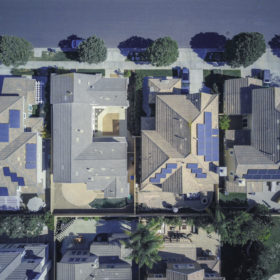Only a few U.S. cities require solar on new homes, and so far, they’ve all been in California. Lancaster led the way in 2013, with Sebastopol, Santa Monica, and San Francisco following.
Now that’s set to change, as South Miami becomes the first city in Florida to require solar panels on new homes, as well as on existing homes that increase their square footage by 75% or more. The regulation approved last night on a 4-1 vote of the city commission mandates 2.75 kW of solar for every 1000 square feet of usable roof space with enough sunshine.
Florida, despite its ample sun, has long been a solar laggard. Only recently has utility-scale solar begun to grow in the state, and distributed solar is just starting to open up there thanks to policy changes that have brought all three major residential solar installers to Florida.
So this new solar mandate is good news, right?
Depends on who you ask.
What will it cost?
Critics of the regulation are bringing up that old familiar refrain: solar is just too expensive for most people. Never mind that this is no longer true. They claim that someone remodeling their home would be saddled with a $25,000 bill. But the cost would be considerably lower after the 30% tax credit and subsequent electric bill savings — plus it would affect only well-off homeowners making a major home addition.
Not everyone is convinced. Truly Burton, Executive Vice President of the Builders Association of South Florida, believes the mandate will make housing more expensive in an area with an increasing housing affordability crisis.
But Mayor Philip K. Stoddard said three local developers have told him they support the solar ordinance. And homebuilders around the country have begun to provide either solar or solar-ready homes as a selling point.
Mayor Stoddard noted, “Solar makes housing MORE affordable, not less affordable. When utility costs are reduced, families have more money for other household expenses.”
And he said the new mandate is limited, applying only to areas of a roof that get at least 5 hours of sun per day. “We do exempt houses with less than 1100 square feet of living area. We don’t expect or require people to put up solar panels in the shade, nor to take down trees,” he said.
Do we have a choice?
For some, it comes down to choice, individual property rights, and freedom from government regulations. Although solar is often marketed as a matter of individual choice, requiring it can be a hard pill to swallow — even for those who support solar in theory.
That’s the case for Burton, who said, “As far as I’m concerned, we can’t build PV fast enough.” It’s the mandate that’s problematic to her organization’s membership. “It’s very well intentioned, but I don’t think they’re going about it in the right way. We support incentives, the carrot and stick approach.”
Still, the solar mandate in the Lancaster, California, has met with a positive response. And there’s strong support for solar in Florida, a state already affected by rising sea levels. A poll on Curbed Miami, though limited in scope, found that 78% of respondents support more Florida cities requiring solar panels on new homes.
“Solar is the right thing to do, it’s a must,” said Raina Russo, founder of women4solar, a Florida advocacy and action firm. “We don’t have the luxury to choose anymore. Sea levels are rising and affecting all of us. We need to act. I applaud Mayor Stoddard’s trailblazing initiative and hope other municipalities and builders will follow suit.”
It’s still not the norm to require onsite energy generation. But some, like Mayor Parris, believe it’s up to municipalities to take these kinds of actions, because so much can be done at the local level that can’t be done nationally — all the more true with the current administration in Washington. Local actions like South Miami’s are continuing a trend already in motion, as cities and states set ambitious clean-energy goals.
This content is protected by copyright and may not be reused. If you want to cooperate with us and would like to reuse some of our content, please contact: editors@pv-magazine.com.








The “no regrets” solution to global warming
Whether or not global warming is entirely or largely due to human use of carbon for fuel, the reduction of the dependence on carbon makes sense.
Reducing carbon fuel use will result in reducing particulate caused asthma in children; reducing particulate caused dementia; reducing black lung disease from coal mining; reducing the production of coal ashes, residues, and effluents; reducing the impact of carbon greenhouse gasses; reducing pipeline failures; reducing coal and oil surface transport accidents; reducing pipeline-related warfare; and reducing smog and other air pollution.
The solution is to conserve energy intelligently, to electrify that which can be intelligently electrified, and to get the electricity from non-carbon sources. This will involve individuals making changes that make externality-blind payback a secondary consideration.
Join the solution or you will be part of the precipitate.
As my chemistry professor advised, “If you’re not part of the solution you will be part of the precipitate.”
An article on the life saving benefits of de-coaling is at
http://www.mtu.edu/news/stories/2017/june/saving-lives-money-potential-solar-replace-coal.html
An article related to carbon involvement in smog is at
http://www.latimes.com/local/lanow/la-me-ln-air-quality-heat-20170615-story.html
An article related to particulate caused asthma and dementia is at
http://science.sciencemag.org/content/355/6323/342
I glad to see the this institution page I want help for more knowledge and practice in solar installer and business community of this field.
Thanks
AMAZING article. Will save as a resource. Thank you!